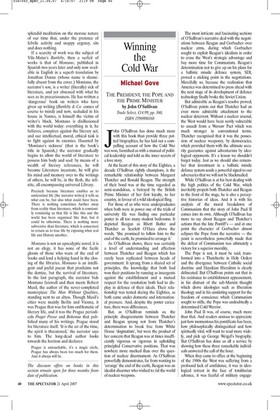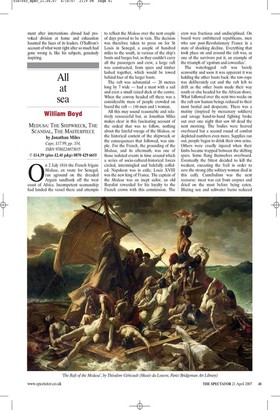Winning the Cold War
Michael Gove
THE PRESIDENT, THE POPE AND THE PRIME MINISTER by John O’Sullivan Trade Select, £14.99, pp. 360, ISBN 1596980168 John O’Sullivan has done much more with this book than provide three potted biographies; he has laid out a compelling account of how the Cold War was won, furnished us with a manual of political leadership and told us the inner secrets of a love story.
At the heart of this story of the Eighties, a decade O’Sullivan rightly champions, is the remarkable relationship between Margaret Thatcher and Ronald Reagan. The strength of their bond was at the time regarded as semi-scandalous, a betrayal by the British Prime Minister of her first loyalty, to her country, in favour of a wild ideological fling.
For those of us who were undergraduates when both were in power one of the trials of university life was finding one particular poster in all too many student bedrooms. It depicted Reagan as Rhett Butler and Thatcher as Scarlett O’Hara above the words, ‘She promised to follow him to the end of the earth, he promised to arrange it.’ As O’Sullivan shows, there was certainly a level of understanding and affection between Thatcher and Reagan which has rarely been replicated between heads of government. It sprang from a shared set of principles, the knowledge that both had won their positions by running as insurgents against the establishment and a mutual respect for the resolution both had to display in defence of their ideals. Their relationship was tested during the Eighties, as both came under domestic and international pressure. And, despite the poster caricature, there were differences.
But, as O’Sullivan reminds us, the principle disagreements between Thatcher and Reagan sprang not from Thatcher’s determination to break free from White House ‘dogmatism’, but were the product of her concern that Reagan was at times insufficiently vigorous or rigorous in upholding principled Conservative positions. That was nowhere more marked than over the question of nuclear disarmament. As O’Sullivan powerfully demonstrates, far from wanting to ‘arrange’ the end of the earth, Reagan was an idealist disarmer who wished to rid the world of nuclear weapons. The most intricate and fascinating sections of O’Sullivan’s narrative deal with the negotiations between Reagan and Gorbachev over nuclear arms, during which Gorbachev sought to exploit Reagan’s idealism in order to erase the West’s strategic advantage and buy more time for Communism. Reagan’s determination not to give up on his plans for a ballistic missile defence system, SDI, proved a sticking point in the negotiations. Mercifully so, because the realisation that America was determined to press ahead with the next stage of its development of defence technology finally broke the Soviet Union.
But admirable as Reagan’s resolve proved, O’Sullivan points out that Thatcher had an even more admirable attachment to the nuclear deterrent. Without a nuclear arsenal, the West would have been newly vulnerable to assault from a Warsaw Pact which was much stronger in conventional terms. Thatcher recognised that it was the possession of nuclear weaponry, by democracies, which provided them with the ultimate security guarantee against adventurism by ideological opponents. It’s a lesson we shouldn’t forget today. Just as we should also remember that investment in a ballistic missile defence system sends a powerful signal to our adversaries that we will not be blackmailed.
While O’Sullivan is at his best dealing with the high politics of the Cold War, which inevitably propels both Thatcher and Reagan to the front of the stage, he is also a perceptive historian of ideas. And it is with his analysis of the moral breakdown of Communism that the story of John Paul II comes into its own. Although O’Sullivan has more to say about Reagan and Thatcher’s actions than the late Pontiff’s — and at one point the character of Gorbachev almost eclipses the Pope from the narrative — the point is nevertheless powerfully made that the defeat of Communism was ultimately a victory for a superior morality, The Pope is not, it must be said, transformed into a Thatcherite in Holy Orders and the divergence between Catholic social doctrine and Hayekian liberalism is clearly delineated. But O’Sullivan points out that in his resistance to establishment appeasement, in his distrust of the sub-Marxist thought which drove ideologies such as liberation theology and in his unstinting support for the freedom of conscience which Communism sought to stifle, the Pope was undoubtedly a determined Cold Warrior.
John Paul II was, of course, much more than that. And readers anxious to appreciate just how momentous his pontificate has been, how philosophically distinguished and how spiritually vital, will want to read more widely, and pick up George Weigel’s biography. But O’Sullivan has done us all a service by showing how these three remarkable individuals answered the call of the hour.
When they came to office at the beginning of the 1980s the West was suffering from a profound lack of confidence, it was in ideological retreat in the face of totalitarian advance, it was fearful of military engage ment after interventions abroad had provoked division at home and exhaustion haunted the faces of its leaders. O’Sullivan’s account of what went right after so much had gone wrong is, like his subjects, genuinely inspiring.



















































































 Previous page
Previous page